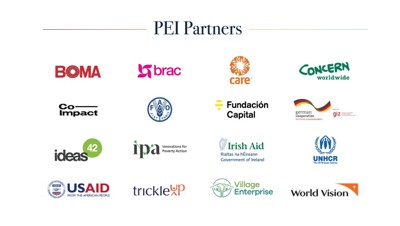- OVERVIEW
- AGENDA
- MATERIALS
- RELATED
The Partnership for Economic Inclusion (PEI) and the Development Impact Department (DIME), in coordination with technical partners, will host the Third Technical Workshop under the PEI Impact Collaborative on October 30th & 31st, 2024. This workshop will highlight the progress made in the Collaborative’s country engagements and spotlight cases that are contributing to close critical knowledge gaps in economic inclusion programming. The workshop will also dive into ongoing efforts to create cutting-edge tools for tracking implementation and capturing the impact of government-led economic inclusion programs.
Objectives:
Foster Discussions: Advance conversations on market effects, resilience to shocks, women’s economic empowerment, implementation quality, and cost-effectiveness.
Share Insights: Provide a platform for operational and research teams to present impact evaluation progress and results, discuss implementation challenges, and receive eedback on measurement.
Encourage Collaborations: Promote peer-to-peer learning among technical partners and practitioners.
The PEI Impact Collaborative convenes implementing partners and technical teams with the goal of enhancing the effectiveness of the next generation of government-led economic inclusion programs. The Collaborative engages with practitioners in selected countries to address strategic policy and operational questions and connects partners across countries to share lessons on effective approaches to scale economic inclusion programming.
Audience:
The technical workshop is open to World Bank operations and research staff, as well as external practitioners and researchers interested in tools to measure impacts for Economic Inclusion programs.
Event Language: English.
 2024 TPAC Meeting Slides
2024 TPAC Meeting Slides
Date: Oct 30-31, 2024
Location (In-Person): Washington, DC
Room: MC 11-500
Please consult our agenda here.
DAY 1: OCTOBER 30, 2024
Opening Remarks (Video recording)
Thematic Sessions (Video recording)
Session 1: Local Economy and Market-level Effects of Economic inclusion Programs
Measuring market impacts: the PEI Impact Collaborative tool and initial results from Ethiopia’s Productive Safety Nets (Margaux Vinez, Senior Economist, SPJ, World Bank; John Loeser, Economist, DIME, World Bank)
Impacts and local spillovers of a light economic inclusion program in Chad (Pascale Schnitzer, Senior Economist, SPJ, World Bank)
The transmission of market effects through micro-enterprises in Kenya (Dennis Egger, Associate Professor, University of Oxford)
Session 2: Understanding the quality of training and coaching
Measuring trainers’ quality: the PEI impact collaborative tool and early lessons from Cameroon’s Project Inclusion des Jeunes (Antoine Deeb, Economist, DIME, World Bank)
Coaching in Economic Inclusion: Learning from Existing Models and Casting a Way Forward (Keetie Roelen, Senior Research Fellow, Centre for the Study of Global Development, Open University)
Zambia’s Supporting Women’s Livelihoods Program: Using phone interviews with beneficiaries and trainers to assess training quality (Ioana Botea, Senior Social Protection Economist, SPJ, World Bank)
DAY 2: OCTOBER 31, 2024
Thematic Sessions (Video recording)
Session 3: Economic inclusion, women’s economic empowerment and gender-based violence
Measuring women’s agency and gender-based violence: the PEI Impact Collaborative tool and plans for South Sudan’s Productive Safety Net for Socioeconomic Opportunities Project (SNSOP) (Arlen Guarin, Economist, DIME, World Bank)
Intrahousehold resource allocation in polygamous households in a large-scale economic inclusion program in Niger (Kelsey Wright, Economist, DIME, World Bank)
Couple’s training, economic inclusion and gender empowerment in Malawi and Mauritania (Julia Vaillant, Senior Economist, Africa GIL, World Bank)
Session 4: Capturing economic inclusion programs’ impacts on resilience to shocks
Measuring short-term outcomes and resilience: The PEI Impact Collaborative Tool and Early Lessons from Ethiopia’s Productive Safety Nets Program (Gashaw T. Abate, Research Fellow, Markets, Trade, and Institutions Unit, IFPRI)
Enduring impacts of economic inclusion during multiple crises: Evidence from Afghanistan’s TUP (Guadalupe Bedoya, Senior Economist, DIME, World Bank)
Lessons from measuring resilience in the Sahel Adaptative Social Protection Program and DIME-WFP’s resilience window (Patrick Premand, Senior Economist, DIME, World Bank)
Session 5: Tracking program costs and implementation quality
Working with implementing partners to capture implementation and costing data: the PEI impact collaborative tools and early results from Malawi’s Social Support for Resilient Livelihoods Project (Emily Beam, Associate Professor, University of Vermont)
Testing implementation variations in the Nigeria National Social Safety Nets Program (NASSP) (Thomas Bossuroy, Senior Economist, SPJ, World Bank; Oyebola Okunogbe, Economist, DECRG, World Bank)
Ghana’s Escaping Poverty Project: Using open-ended and counterfactual feedback questions (Dean Karlan, Professor of Economics, Northwestern University)
Closing Remarks (Video recording)
Date: October 30 - 31, 2024 ET
Location: Hybrid
